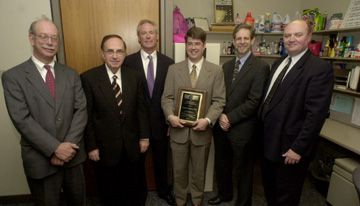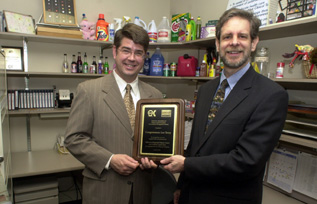 |
Left to right: Fred Salzinger, Creighton University associate vice president for health sciences; Harold M. Maurer, M.D., UNMC chancellor; Dave Karnes, lobbyist/legal Counsel for the American Association of Poison Control Centers; Lee Terry, U.S. congressman, 2nd Nebraska District; Steven Seifert, M.D., medical director, Nebraska Regional Poison Center; Mike Powell, head of The Nebraska Medical Center department of pharmacy. |
Originally passed by Congress in 1999, the Poison Centers Enhancement and Awareness Act provides federal support to the nation’s poison centers. That support was scheduled to end this year.
David Karnes, legal counsel for the American Association of Poison Control Centers, said that Congressman Terry provided outstanding leadership in the House of Representatives to secure the five-year reauthorization of funding for America’s network of Poison Control Centers, of which the Nebraska Regional Poison Center is a part.
 |
U.S. Congressman Lee Terry, left, receives a plaque from Steven Seifert, M.D., of the Nebraska Regional Poison Center. |
The Nebraska Regional Poison Center, which was among the first 10 poison centers in the country, has been in operation since 1957. The center receives more than 35,000 calls a year and is certified as a regional center by the American Association of Poison Control Centers. The center’s support comes from a cooperative agreement between the University of Nebraska Medical Center; its hospital partner, The Nebraska Medical Center; and Creighton University Medical Center, with additional support from the State of Nebraska.
Cam Enarson, M.D., M.B.A., vice president for Health Sciences and dean of the School of Medicine at Creighton University, said that locally and regionally, the Nebraska Regional Poison Center plays a vital role in preventing, detecting and responding to poisonings, which results in saved lives.
“Creighton University extends a thank you to Congressman Terry for his efforts in helping to secure federal support for the nation’s poison control centers, including the Nebraska poison center,” Dr. Enarson said. “Creighton University is pleased to collaborate with the University of Nebraska Medical Center and the state of Nebraska to maintain and expand the services of the Nebraska Regional Poison Center, which is a critical component of our public health system.”
UNMC Chancellor Harold M. Maurer, M.D., said a key public health component will remain in the state, largely because of Congressman Terry’s work.
“Congressman Terry is to be congratulated for his efforts to secure funding for the poison centers,” Dr. Maurer said. “This public health initiative results in greater efficiency and better service to the public.”
Steven Seifert, M.D., the medical director of the Nebraska poison center, said that the federal act will provide federal support to the nation’s poison centers in the amount of almost $30 million a year for the next five years.
Dr. Seifert noted that the nation’s network of poison centers is a critical component of the U.S. public health system. Nationwide, approximately 4 million poisonings occur annually (not including alcohol), resulting in 300,000 hospitalizations and costing the nation $12.6 billion. Between 1990 and 2001, poisoning was the second-leading cause of injury-related mortality, responsible for about 30,800 deaths in 2001 alone.
“With the new concerns about biological, chemical or nuclear terrorist threats, poison center will play a key role in preventing, detecting and responding to potential mass poisoning events,” Dr. Seifert said. “Our system of regional centers also provides local and regional toxicological services, and contributes to the nation’s health surveillance efforts through the Toxic Exposure Surveillance System (TESS).”
Michael Powell, director of pharmaceutical and nutrition care at The Nebraska Medical Center, noted that the poison centers have been shown to produce a better return-on-investment than all other public health initiatives except childhood immunizations. It is estimated that poison centers save more than $7 in health care costs for each dollar invested.
“It was an important effort to secure this funding, and we appreciate that Congressman Terry sees the importance of the poison centers,” Powell said.
A lack of funding has cut the number of poison centers in recent years. At its peak, more than 700 poison centers operated in the United States. Now, there are 62. The current level of federal support provides less than 20 percent of poison centers’ operating budgets.
Poison centers now provide service to nearly all of the United States and its territories. They provide poison and drug information to the public and to health professionals 24 hours a day, 365 days a year. In 2003, poison centers received more than 2.3 million calls.
In April, the Institute of Medicine, after an 18-month process of investigation and analysis, released its report on the future of poison centers in the United States. The report, titled “Forging a Poison Prevention and Control System,” can be found at http://www.nap.edu/books/0309091942/html/.
In this report, the IOM recognized the unique contributions of poison centers and the importance of a coordinated system of regional poison centers integrated into the public health system.
Responding to the financial instability that has plagued poison centers, the IOM has called for full federal support of poison centers’ core functions, integration into the public health system and new research.